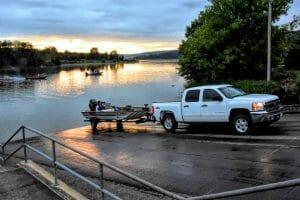
Whether you plan on spending the day at a nearby lake fishing alone, hitting the road for a weekend getaway with the guys, or taking the entire family on a week-long outdoor adventure, having safe and convenient transportation is essential. From not having enough space for passengers and gear to getting stranded on the side of the road, there’s a lot of things that could go wrong. As these incidents can ruin your experience, you must be prepared.
Select the Right Vehicle
The first tip is to select the right vehicle for your fishing trip. You must consider factors like the number of passengers, terrain types, and storage space. If you’re riding solo or taking a single travel companion along, a pick-up with truck bed drawers to store your fishing gear would suffice. Pick-up trucks are durable, carry a large load, and are ideal for just about any terrain. On the other hand, if you’re taking the entire family on an extended trip, you might prefer a small recreational vehicle (RV) or a large passenger van to ensure everyone is comfortable.
Have Your Vehicle Serviced
If you’re taking your vehicle on your fishing trip, be sure to have it serviced by a mechanic in advance. The more miles you put on your car or truck, the less efficient it becomes. You want to ensure that it is up to par to get you to and from your destination. Let your mechanic know that you’re going to be traveling so that they can check the fluids, tire pressure, brake pads, and other mechanical parts for maintenance and repair.
If you plan on renting a vehicle, be sure to do an inspection before pulling off the lot. Check for lights on the dashboard, look under the hood to ensure the fluids are fresh and full and do a test drive to ensure it operates efficiently. If there are any issues, bring them up to the rental agency so they can be addressed.
Pack Safely
From clothes and toiletries to cookware and fishing gear, there are a lot of things you need to bring on your trip. However, loading your vehicle with too much stuff can be dangerous. It can block your view or fall off while you’re driving. Therefore, you must pack safely. Try to keep personal items to one bag. Secure fishing gear and cookware with bungee cords or rope. If you’re going to use a car rack, be sure that it is correctly secured to the vehicle to prevent an accident. Lastly, keep all luggage clear from the rear window, so you don’t create blind spots.
Fuel Up Before You Go
Depending on where you’re traveling, gas stations may be hard to locate. Unless you want to end up stuck on the road’s side, it’s a good idea to fuel up before your trip. Find a nearby gas station the night before and fill your gas tank to the top. Try to keep the tank above the halfway point by pulling over for gas along your route.
Program Directions
There’s nothing more annoying than getting lost on the road. Finding your way back can take hours off your day. While having a roadmap handy is ideal, you should also make use of your vehicle’s GPS. Programming the coordinates in the system in advance can help you select the best route and prevent you from getting lost on the way.
Don’t Forget Insurance and Roadside Assistance
 You never know what could happen while traveling to your fishing destination. While completing the preparations above can reduce your risks, it’s always good to have a backup plan. Ensure that you have adequate car insurance coverage to provide financial protection in the event of an accident. Signing up for roadside assistance is also recommended. Should you find yourself stranded, a quick phone call could get you auto service on the spot. From fixing a flat tire to towing your vehicle to a nearby mechanic, you’ll have peace of mind as a paid member.
You never know what could happen while traveling to your fishing destination. While completing the preparations above can reduce your risks, it’s always good to have a backup plan. Ensure that you have adequate car insurance coverage to provide financial protection in the event of an accident. Signing up for roadside assistance is also recommended. Should you find yourself stranded, a quick phone call could get you auto service on the spot. From fixing a flat tire to towing your vehicle to a nearby mechanic, you’ll have peace of mind as a paid member.
Going on a fishing trip is a lot of fun. There’s just something about being out on the open water, taking in the beautiful sites, and conversing with friends and family as you hone in on your skills. If you’re going to get there safely and comfortably, you must use the advice provided above to prepare your ride in advance.

